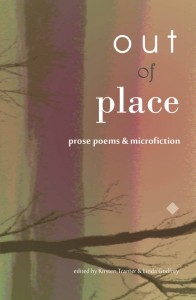Haider Catan’s prose poem published in Out of Place juxtaposes Australian bushfires with complex memories of his life in Iraq. In this interview he talks about the inspiration behind this piece, about the writing process and about writers he admires. To read Haider’s poem and stacks of other great microlit, grab a copy of Out of Place – just click the cover below.
What inspired you to write the piece of micro-literature, which will appear in Out of Place? How would you describe this form of writing?
Purple Breeze – it started with smell of bushfires in the summer of 2013. It was the first time I became near enough to an Aussie bushfire. I have not smelled this sort of woody burning since a while, but it seemed familiar. The smoke itself has complicated representations inside me, and Australia could make it even more complicated. I felt my skin had been stirred in the early morning by the smell of ashes, which sent me out to the Iraqi countryside, to my spicy childhood, to palm trees and canes; to the redolence of my grandmother with her cooking and cigars; to the woody life far away from iron-based life. This Purple Breeze is about peace; its smoke reflects past-based peace from Iraqis and present-based peace from Australians. Perhaps, as I grew up with wars, I appreciate wood which is about peace and paradise, while iron is linked in my head with the revulsion of weaponry environment or the war atmosphere.
I see this piece is about my memory by matching between the past and the present in order to taste something about the actuality of the smell of love and peace, trying to pretend that war is not even has memory, or maybe its wounds have being deleted or replaced by less threatening representations inside my memory.
How do you know the point at which a piece you are writing should end? Do you have any favourite closing line/s from your own work or from another writer? If so, which ones and why?
Before I proceeded in writing the piece, I was reciting some rhymes in Iraqi. Later, I attempted to translate these rhymes to English, but I could not know that I will end up with a prose poem with what i think is a ‘fair finish’.
“so when i hear my nickname, “hudooish”, i recognise why this name tastes of wood and salty tears in my mouth”.
Also I enjoy the part of coping the Aussie people’s words, which I really adore as the words I hear from them which involve, by its semantic indications, a lot of peace.
“no worries, mate. it’s pure wood, war-iron free, but the wild nature hurts and heals our injuries , mate”
Tell us about some of the writers that you’ve loved in the past and who you are reading now.
From Modern Arab poets, I read the beautiful sadness of Muzaffar Al-Nawab and sarcastic sadness of Muhammad al-Maghut; as well the poems that talk to the human self from the poetry of Mahmoud Darwish and Adunis. I also love reading some translated poems of Pablo Neruda.
From Australian poetry, so far I really relished reading Mad Oaks of Christine Paice, besides diverse Australian poets; reading and translating with my poet friend Tim Heffernan some selected Arabic poems from Iraqis in particular.
What you do if you haven’t written anything in a while and you want to get started writing again? Share one of your favourite writing exercises with our readers.
I write when something could manipulate my heartbeat. I do not think it is a good idea to pursue this sort of manipulation to become a writer. I feel contented by walking in absolute spontaneous steps, reconciled with the life by its joy or pain.
When a poem hits me I would be alone and free at least in my imagination, and I prefer walking and talking to myself with some rhythms or ideas, hold a short baby poem in my head, then, the baby poem is lucky if I get more loneness, for more guarantee to it to be survived or developed.


